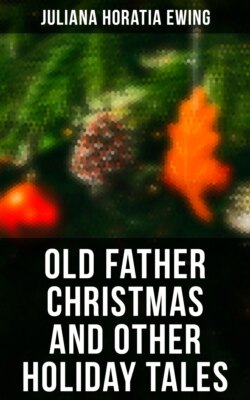Читать книгу Old Father Christmas and Other Holiday Tales - Juliana Horatia Ewing - Страница 13
На сайте Литреса книга снята с продажи.
INTO THE MIST.
ОглавлениеUnfortunately the favorable impression produced by “the gipsy lad’s” daring soon passed from the farm-bailiff’s mind. It was partly effaced by the old jealousy of the little ladies’ favor. Miss Betty gave the boy no less than four silver shillings, and he ungraciously refused to let the farm-bailiff place them in a savings bank for him.
Matters got from bad to worse. The farming man was not the only one who was jealous, and John Broom himself was as idle and reckless as ever. Though, if he had listened respectfully to the Scotchman’s counsels, or shown any disposition to look up to and be guided by him, much might have been overlooked. But he made fun of him and made a friend of the cowherd. And this latter most manifest token of low breeding vexed the respectable taste of the farm-bailiff.
John Broom had his own grievances too, and he brooded over them. He thought the little ladies had given him over to the farm-bailiff, because they had ceased to care for him, and that the farm-bailiff was prejudiced against him beyond any hope of propitiation. The village folk taunted him, too, with being an outcast, and called him Gipsy John, and this maddened him. Then he would creep into the cowhouse and lie in the straw against the white cow’s warm back, and for a few of Miss Betty’s coppers, to spend in beer or tobacco, the cowherd would hide him from the farm-bailiff and tell him country-side tales. To Thomasina’s stories of ghosts and gossip, he would add strange tales of smugglers on the near-lying coast, and as John Broom listened, his restless blood rebelled more and more against the sour sneers and dry drudgery that he got from the farm-bailiff.
Nor were sneers the sharpest punishment his misdemeanors earned. The farm-bailiff’s stick was thick and his arm was strong, and he had a tendency to believe that if a flogging was good for a boy, the more he had of it the better it would be for him.
And John Broom, who never let a cry escape him at the time would steal away afterwards and sob out his grief into the long soft coat of the sympathizing sheep dog.
Unfortunately he never tried the effect of deserving better treatment as a remedy for his woes. The parson’s good advice and Miss Betty’s entreaties were alike in vain. He was ungrateful even to Thomasina. The little ladies sighed and thought of the lawyer. And the parson preached patience.
“Cocky has been tamed,” said Miss Kitty, thoughtfully, “perhaps John Broom will get steadier by-and-by.”
“It seems a pity we can’t chain him to a perch, Miss Kitty,” laughed the parson; “he would be safe then, at any rate.”
Miss Betty said afterwards that it did seem so remarkable that the parson should have made this particular joke on this particular night—the night when John Broom did not come home.
He had played truant all day. The farm-bailiff had wanted him, and he had kept out of the way.
The wind was from the east, and a white mist rolled in from the sea, bringing a strange invigorating smell, and making your lips clammy with salt. It made John Broom’s heart beat faster, and filled his head with dreams of ships and smugglers; and rocking masts higher than the willow tree, and winds wilder than this wind, and dancing waves.
Then something loomed through the fog. It was the farm-bailiff’s speckled hat. John Broom hesitated—the thick stick became visible.
Then a cloud rolled between them, and the child turned, and ran, and ran, and ran, coastwards, into the sea mist.
